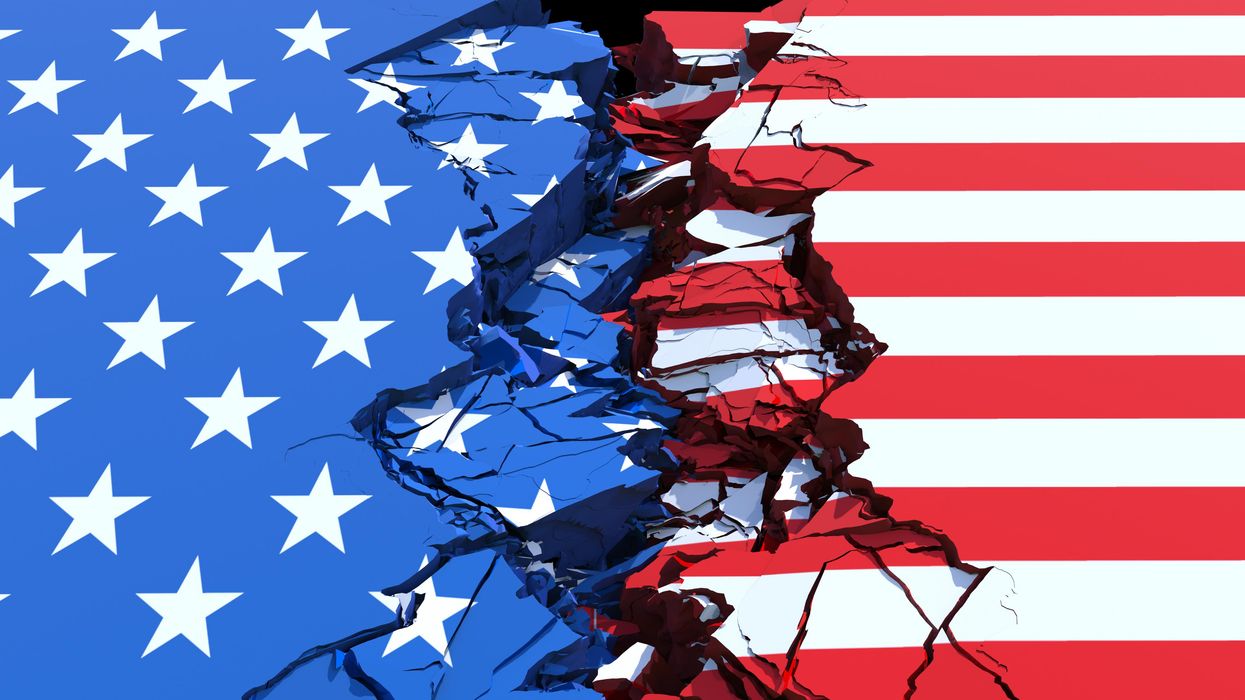The disgraceful storming of the Capitol has led House Democrats to ready a vote Wednesday impeaching President Trump for inciting the mob, and polling shows most Americans want him removed before his time expires next week. But the vast majority of Republicans oppose impeachment, and many still believe Trump's baseless assertion that he's being denied another term because of election fraud.
So there is undeniably deep division between Democrats and Republicans. But self-described independents, who account for two-fifths of the electorate, are currently siding with the Democrats by 2-to-1. They are hardly evenly divided on impeachment — and it's similarly impossible to prove the leanings of these 100 million are evenly divided between the two parties.
As a result, it is misleading to say we are a nation divided into two opposing groups. In reality, there are three groups, and you can appreciate this by considering three images of the country.
One is for Trump's backers. The next is for President-elect Joe Biden's supporters. The last is for those who either didn't vote, or voted for either Biden or Trump even though they were not passionately committed to either candidate.
Here is the Trump supporter picture, taken before the end of last week: He is at the White House sitting in bed and tweeting away. We see citizens reading his posts; they are either smiling or cheering, or locking their doors, or grabbing their guns, or checking their investment portfolios on their phones. We see them in churches. Others are at car races and horse races wearing MAGA hats. They are also in their small businesses and at assembly lines, with their hats, assembling machines or working at personal computers. They are predominantly white, and a good number are in rural areas.
Here is the Biden supporter picture: Citizens are marching in the streets of several cities, protesting Trump and protesting the establishment. They are Blacks, women, environmentalists and members of the LGBTQ community. Others are praying in churches and synagogues, holding pictures of loved ones hospitalized with Covid-19. We see the poor and working-class Americans, on foot or in their cars, waiting at food banks. We see others telling their therapists and internists how relieved they are that their candidate won. They are teachers and professors, nurses and bus drivers. Half are white, but most are living in cities or suburbs.
Here is the third picture: It's dark and you can't see any people, but you can see captions of what they are saying: "I'm a moderate, and I voted for Biden because I don't like Trump." "I'm a moderate and I voted for Trump, but I don't love him." "I don't vote. The parties are the same. They both screw the middle class." "I don't vote either. And no one ever calls me to ask me why." "I stopped voting in 1976 after Richard Nixon was thrown out of office. I don't follow politics anymore." "I'm an independent, and I don't like either major party. I ignore them both. I vote in some elections." "I'm an independent, and I do follow politics. I usually vote for the Republican." "I'm an independent, and I also follow politics, and I usually vote for the Democrat."
The curious thing about this picture is that we can't see whether these people are living in the country, in cities or in suburbia — in a row house or a big new Colonial. And we cannot see their race or gender. Indeed, we know very little about them other than that about half are what political scientists call "low information voters." This group makes up about 40 percent of Americans old enough to cast a ballot.
What we don't have, then, is one image of America where everyone is rowing the same boat with their own oar. What we don't have is a massive blue army fighting a massive red army as though it were a battle in the Civil War.
There are really three Americas, and they cut across all of the most popular categories. We know a great deal about the pure Democrats and the pure Republicans. We know very little about the moderates and independents who vote for both sides and those citizens who don't vote at all. Independents alone account for two of every five adults eligible to vote. And about 80 million of that group, many millions of them unaffiliated with either party, didn't even vote at all this year.
The media insists that there are two categories, the D's and the R's. Our Washington politicians, who are deeply polarized, also act as though these are the only two options.
In the years ahead we need to recover from Trump, support Biden because he is going to be the president at a very difficult time — and give voice to those who are not part of the polarization drama. Only 51 percent of the 158 million people who voted cast their votes for Biden, while 47 percent went with Trump.
But these figures convey the misleading impression that we are a country divided between two sides. We are not.
Last week's awful assault on Congress should not only cause some Trump supporters to question their allegiance to the Trump Republican Party; it should also throw light on the fact that there are tens of millions of Americans who do not identify with the bitter polarization battles of Washington in the first place.
The new president, and the new Democratic Congress, need to represent all Americans. Not just those who voted for Biden with enthusiasm, or Trump with enthusiasm, but those who voted for Biden and Trump without enthusiasm and those who did not vote at all.




















